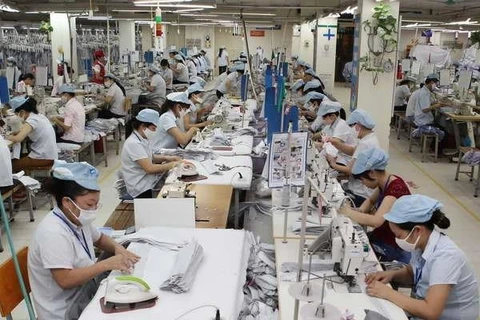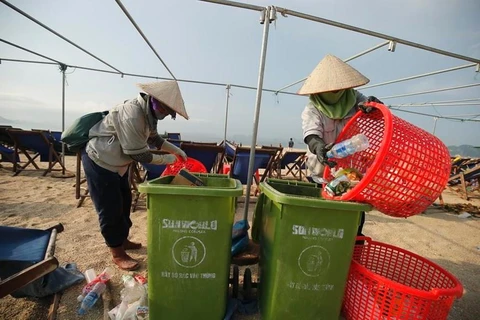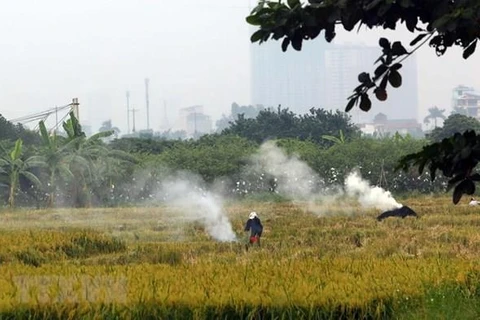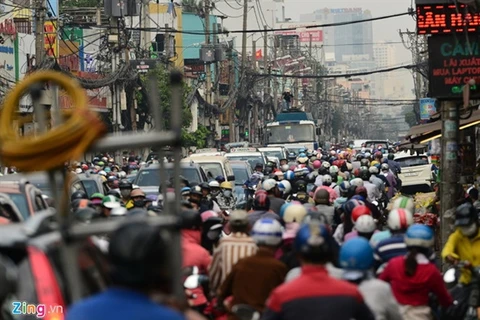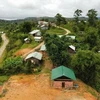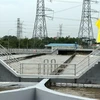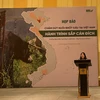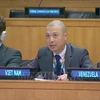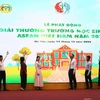Hanoi (VNS/VNA) - Hanoi's Department of Natural Resources and Environment has outlined a plan to reduce air pollution in 2020.
'Green Initiates for Hanoi' will focus on air quality management, waste management, energy, urban planning, and green living with sustainable consumption.
The department will develop an air monitoring network using low-cost air pollution sensors in selected areas of the city to provide online updates for the public regarding pollution levels.
Air sensors will initially be installed in public places and 25 schools and offices in the city.
To increase public awareness about air pollution, regular activities will be held and the issue of air quality will be included in the school curriculum.
Waste management will include limiting the burning of agricultural waste, reducing plastic use and enhancing waste collection.
“Burning straw and agricultural waste is one of the main reasons for serious air pollution and increasing greenhouse gas emissions in the city,” said Le Thanh Thuy, an expert from the department.
“The department will carry out a pilot programme to show farmers how to use probiotics to produce compost from straw,” she said.
To reduce the use of energy, efficiency models will be introduced including the use of energy-saving bulbs, and the use of renewable energy for cooking, heating and lighting.
The city will also carry out campaigns to reduce plastic waste, promote the use of environmentally-friendly products, set up green offices and promote organic agriculture.
“A green office is an environmental management system focusing on changing employees' perceptions and behavior towards sustainable consumption practices. This helps solve existing problems and reduce costs and the environmental impacts of an organisation's activities to benefit the organisation and create a healthy, friendly working environment,” said Thuy.
The plan was introduced at a workshop dubbed “City Initiatives in Climate Change and the Key Progress in Developing City Promises” which was co-held by the department and the global network ICLEI - Local Governments for Sustainability.
The workshop was in the framework of the Ambitious City Promises campaign implemented by the ICLEI and funded by the International Climate Initiative under Germany’s Ministry of the Environment, Nature Conservation, Building and Nuclear Safety, which focuses on reducing greenhouse gas emissions through participatory and inclusive local climate action.
The project is designed to advance this work by increasing the capacity of local governments, engaging citizens and driving climate action through low emission strategies.
The Promise of Seoul which is at the heart of the project, is a comprehensive climate action plan launched by the Republic of Korea in 2015.
The Promise of Seoul selected Southeast Asian cities, including Vietnam’s Hanoi, Soc Son and Son Tay, Indonesia’s Jakarta, Bekasi and Tangerang, and the Philippines’s Pasig, Parañaque and Marikina to make ambitious commitments, mainstream low emission strategies and cultivate new climate champions in the region.
“The project aimed to call big cities in the Southeast Asia with first countries of Vietnam, Indonesia and Philippines to commit cutting the greenhouse gas emission and support the cities to set up their action plans,” said Ranell Martin Dedicatoria from the ICLEI.
The engagement of governments from central to grassroots levels to activate climate change response was very significant, he said./.
'Green Initiates for Hanoi' will focus on air quality management, waste management, energy, urban planning, and green living with sustainable consumption.
The department will develop an air monitoring network using low-cost air pollution sensors in selected areas of the city to provide online updates for the public regarding pollution levels.
Air sensors will initially be installed in public places and 25 schools and offices in the city.
To increase public awareness about air pollution, regular activities will be held and the issue of air quality will be included in the school curriculum.
Waste management will include limiting the burning of agricultural waste, reducing plastic use and enhancing waste collection.
“Burning straw and agricultural waste is one of the main reasons for serious air pollution and increasing greenhouse gas emissions in the city,” said Le Thanh Thuy, an expert from the department.
“The department will carry out a pilot programme to show farmers how to use probiotics to produce compost from straw,” she said.
To reduce the use of energy, efficiency models will be introduced including the use of energy-saving bulbs, and the use of renewable energy for cooking, heating and lighting.
The city will also carry out campaigns to reduce plastic waste, promote the use of environmentally-friendly products, set up green offices and promote organic agriculture.
“A green office is an environmental management system focusing on changing employees' perceptions and behavior towards sustainable consumption practices. This helps solve existing problems and reduce costs and the environmental impacts of an organisation's activities to benefit the organisation and create a healthy, friendly working environment,” said Thuy.
The plan was introduced at a workshop dubbed “City Initiatives in Climate Change and the Key Progress in Developing City Promises” which was co-held by the department and the global network ICLEI - Local Governments for Sustainability.
The workshop was in the framework of the Ambitious City Promises campaign implemented by the ICLEI and funded by the International Climate Initiative under Germany’s Ministry of the Environment, Nature Conservation, Building and Nuclear Safety, which focuses on reducing greenhouse gas emissions through participatory and inclusive local climate action.
The project is designed to advance this work by increasing the capacity of local governments, engaging citizens and driving climate action through low emission strategies.
The Promise of Seoul which is at the heart of the project, is a comprehensive climate action plan launched by the Republic of Korea in 2015.
The Promise of Seoul selected Southeast Asian cities, including Vietnam’s Hanoi, Soc Son and Son Tay, Indonesia’s Jakarta, Bekasi and Tangerang, and the Philippines’s Pasig, Parañaque and Marikina to make ambitious commitments, mainstream low emission strategies and cultivate new climate champions in the region.
“The project aimed to call big cities in the Southeast Asia with first countries of Vietnam, Indonesia and Philippines to commit cutting the greenhouse gas emission and support the cities to set up their action plans,” said Ranell Martin Dedicatoria from the ICLEI.
The engagement of governments from central to grassroots levels to activate climate change response was very significant, he said./.
VNA

